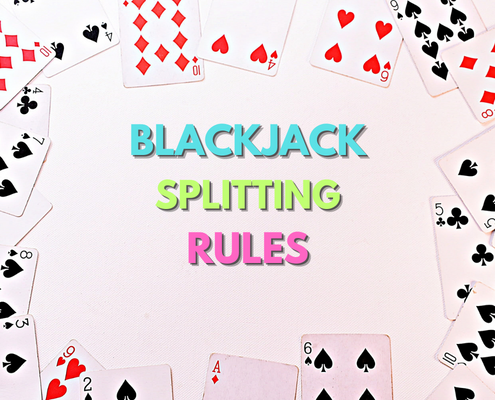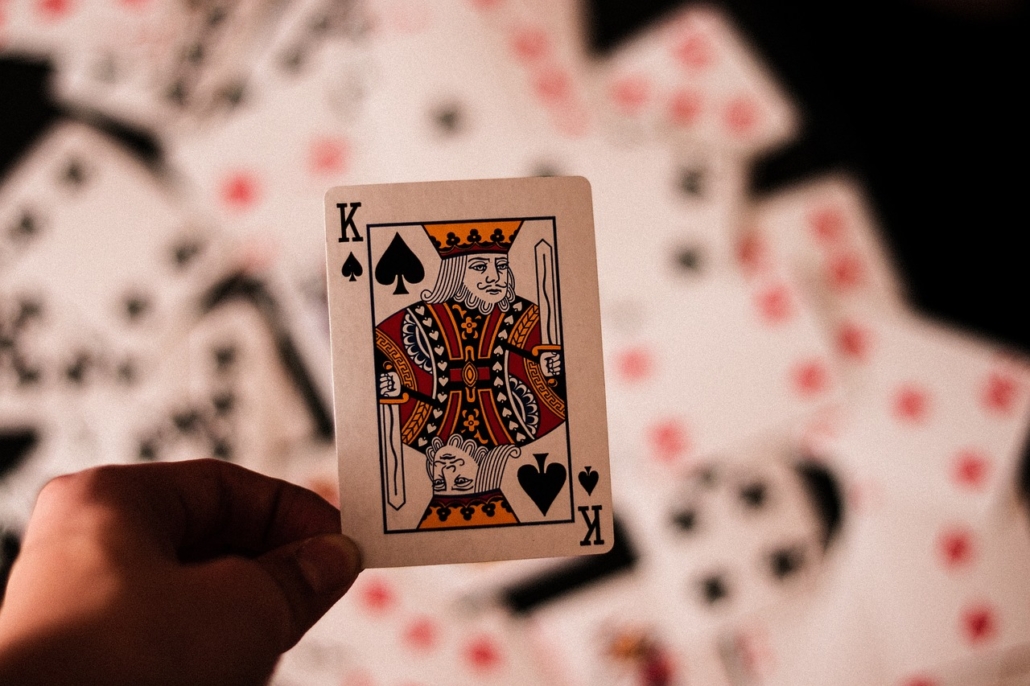Blackjack Splitting Rules: A Comprehensive Guide
Factors to Consider When Splitting
When deciding whether to split a pair or not, you should also take into account the following factors:
- The dealer’s up card: This is the most important factor to consider when deciding whether to split or not. If the dealer has a weak up card (2-6), it is usually a good idea to split. If the dealer has a strong up card (7-A), it is generally better to avoid splitting.
- The number of decks: The number of decks in play can also affect your splitting decisions. In general, if there are more decks in play, it is less likely that you will be dealt a pair, so you should be more inclined to split.
- The house rules: Different casinos may have different rules regarding splitting, so it is important to know the specific rules of the casino you are playing in.
How to Split Pairs
Once you have decided to split a pair, there are some additional rules that you should follow:
- Place an additional bet: When you split a pair, you need to place an additional bet equal to your original bet.
- Play each hand separately: Each split hand is played separately, so you need to make decisions for each hand separately.
- No blackjack after splitting aces: If you split aces, you will only receive one additional card for each ace, and blackjack is not possible on split hands.
- Splitting eights: If you split eights and receive a ten-value card on either hand, it is not considered a blackjack, but rather a regular 21 hand.
Understanding Blackjack Splitting Rules
In blackjack, splitting pairs can be a great strategy for players to gain an advantage over the dealer. However, not all pairs should be split. The basic rule is to split only pairs and not all pairs. Additionally, aces and eights should always be split, while tens, fives, and fours should never be split. Meanwhile, twos, threes, sixes, and sevens should only be split if the dealer’s up card is low.
By splitting pairs, players can potentially win more hands by creating two new hands out of a pair of equal cards. A player who chooses to split a pair must place an additional bet equal to the original bet. Splitting pairs creates more opportunities for winning hands, but it also means the player takes on additional risk.
Our Splitting Sheet
| Pair | Dealer’s Up Card | Split? |
|---|---|---|
| Aces | 2-6, 8-10, Ace | Always split |
| Eights | 2-10, Ace | Always split |
| Tens | Never split | Never split |
| Nines | 2-6, 8-9 | Split if allowed |
| Sevens | 2-7 | Split if allowed |
| Sixes | 2-6 | Split if allowed |
| Fives | Never split | Never split |
| Fours | 5-6 | Split if allowed |
| Threes | 5-6 | Split if allowed |
| Twos | 2-7 | Split if allowed |
Pros and Cons of Splitting Pairs
Pros
- Increases the number of potentially winning hands: Splitting pairs in blackjack can increase the number of potentially winning hands that a player can have. By splitting pairs, a player can create two new hands out of a pair of equal cards, thus increasing their chances of winning.
- Can double the chances of getting a natural blackjack (when splitting aces): When splitting aces, a player has the opportunity to receive two natural blackjacks instead of just one. This can double their chances of receiving a payout for a natural blackjack.
- Can potentially lead to higher payouts: Splitting pairs can also lead to higher payouts if both hands win. For example, if a player splits a pair of eights and both hands win, they will receive twice the payout they would have received if they had not split the pair.
- Can help to minimize losses in certain situations: In certain situations, such as when the dealer has a weak up card, splitting pairs can help to minimize losses. For example, if a player has a pair of sixes and the dealer has a weak up card of 2-6, splitting the pair can help to increase the player’s chances of winning one of the hands.
Cons
- Increases the amount of money at risk: Splitting pairs in blackjack requires the player to place an additional bet, which increases the amount of money that is at risk. This can be a disadvantage for players who are not comfortable with taking on additional risk.Can lead to losing more money if both split hands end up losing: Splitting pairs can also lead to losing more money if both split hands end up losing. For example, if a player splits a pair of tens and both hands lose, they will lose twice the amount they would have lost if they had not split the pair.Splitting certain pairs (such as 10s) can decrease the player’s chances of winning: Splitting certain pairs, such as pairs of tens, can actually decrease the player’s chances of winning. This is because a pair of tens is a strong hand, and splitting them into two separate hands can weaken both hands.Requires the player to have a good understanding of basic blackjack strategy and the splitting rules: Splitting pairs in blackjack requires the player to have a good understanding of basic blackjack strategy and the splitting rules. Players who do not understand these rules may make poor decisions that can cost them money in the long run.
How to Weigh the Pros and Cons
When weighing up the pros and cons of splitting pairs in blackjack, it is important to consider several factors to make an informed decision. Some of the factors to consider include:
- The dealer’s up card: This is the most important factor to consider when deciding whether to split or not. If the dealer has a weak up card (2-6), it is usually a good idea to split. If the dealer has a strong up card (7-A), it is generally better to avoid splitting.
- The number of decks: The number of decks being used in the game can also affect the player’s decision to split. In general, the more decks being used, the less likely it is that the player will be dealt a pair, so they should be more inclined to split.
- Specific rules of the casino: Different casinos may have different rules regarding splitting. It is important for players to know the specific rules of the casino they are playing in, as this can affect their decision to split.
- Bankroll: Splitting pairs requires the player to place an additional bet, which increases the amount of money at risk. Players who have a limited bankroll may want to avoid splitting pairs, as it can be a riskier strategy.
- Experience: Splitting pairs in blackjack requires the player to have a good understanding of basic blackjack strategy and the splitting rules. Players who are not experienced with these rules may want to avoid splitting pairs until they have a better understanding of the game.
By considering these factors, players can weigh up the pros and cons of splitting pairs in blackjack and make an informed decision that is right for them. It is important to remember that splitting pairs can be a useful strategy in certain situations, but it also carries additional risk. Therefore, players should always approach this strategy with caution and consider all of the factors before making a decision.
Other Factors to Consider When Splitting
When deciding whether to split a pair or not, players should consider various factors. The dealer’s up card is the most important factor to consider. If the dealer has a weak up card, like a 2-6, it is generally a good idea to split. On the other hand, if the dealer has a strong up card, such as 7-A, it is generally better to avoid splitting. The number of decks being used in the game can also affect the player’s decision to split. In general, the more decks being used, the less likely it is that the player will be dealt a pair, so they should be more inclined to split.
Another important factor to consider when splitting pairs is the house rules. Different casinos may have different rules regarding splitting. Some casinos may allow players to split a pair of aces multiple times, while others may only allow it once. Therefore, it is important for players to know the specific rules of the casino they are playing in.
How to Split Pairs
Once a player has decided to split a pair, they must follow some additional rules. First, they must place an additional bet equal to their original bet. This is necessary because splitting pairs creates two new hands, each of which requires its own bet.
After placing the additional bet, each split hand is played separately, meaning the player must make decisions for each hand separately. It is also important to note that if a player splits a pair of aces, they will only receive one additional card for each ace. Blackjack is not possible on split hands.
Finally, if a player splits a pair of eights and receives a ten-value card on either hand, it is not considered a blackjack, but rather a regular 21 hand.
Conclusion
In conclusion, splitting pairs is an important strategy in the game of blackjack, but it is crucial to know the splitting rules in order to make the right decisions. Remember to only split pairs when the dealer’s up card is low, always split aces and eights, and avoid splitting tens, fives, and fours. By following these rules, players can increase their chances of winning.
However, it is important to consider other factors as well, such as the number of decks and the specific rules of the casino. By being well-informed, players can make informed decisions and potentially win more hands in the game of blackjack.
FAQ
What is splitting in blackjack?
Splitting in blackjack is the strategy of dividing a pair of cards of equal rank into two separate hands. This can potentially increase the number of winning hands a player can have.
When should I split in blackjack?
Players should split pairs in blackjack when the dealer’s up card is weak (2-6) and the player has a pair of aces or eights. Pairs of twos, threes, sixes, and sevens should only be split if the dealer’s up card is low. Pairs of tens, fives, and fours should never be split.
What are the benefits of splitting in blackjack?
Splitting pairs in blackjack can potentially increase the number of winning hands a player can have, double the chances of getting a natural blackjack, lead to higher payouts, and help to minimize losses in certain situations.
What are the risks of splitting in blackjack?
Splitting pairs in blackjack requires the player to place an additional bet, which increases the amount of money at risk. Additionally, splitting certain pairs (such as 10s) can decrease the player’s chances of winning, and splitting pairs can lead to losing more money if both split hands end up losing.
What should I consider before splitting in blackjack?
Before splitting in blackjack, players should consider the dealer’s up card, the number of decks being used, the specific rules of the casino, their own bankroll, and their level of experience with basic blackjack strategy and splitting rules.
How many times can I split in blackjack?
The number of times a player can split in blackjack depends on the specific rules of the casino. Some casinos may allow players to split pairs multiple times, while others may only allow it once.
What should I do if I’m unsure whether to split in blackjack?
If a player is unsure whether to split a pair in blackjack, they can refer to a basic strategy chart or ask the dealer for advice. It is also important to remember that splitting pairs is not always necessary and players can still win without splitting.




